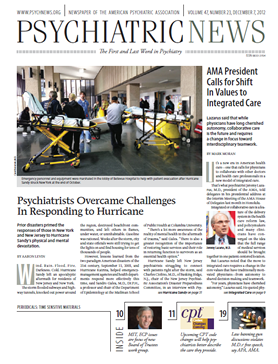As providers of care and consultation, physicians play a crucial role in educating patients about factors that could pose risks to their health and safety, including those associated with the presence of firearms in their homes.
This is a major assertion of APA, the AMA, and eight other medical specialty societies in an amicus brief submitted in November to the U.S. Court of Appeals for the Eleventh Circuit urging the justices to reject Florida’s attempt to revive its controversial law known as the Firearm Owners’ Privacy Act.
Signed into law on June 2, 2011, by Florida Gov. Rick Scott (R), the act restricts physicians from inquiring about or recording information related to patients’ gun ownership or the presence of guns owned by family members and kept in a patient’s home, unless it is “relevant to the patient’s medical care or safety, or the safety of others”—that is, if the physician determines that a patient’s access to a gun poses a direct and immediate threat. Physicians found in violation of the law could face various forms of discipline, including permanent revocation of their medical license.
“The Florida statute is part of a pernicious trend of states attempting to achieve political ends by limiting physicians’ freedom in interacting with their patients,” said Paul Appelbaum, M.D., the Dollard Professor of Psychiatry, Medicine, and Law and director of the Division of Law, Ethics, and Psychiatry at Columbia University, chair of the APA Committee on Judicial Action, and a past APA president, in an interview with Psychiatric News. “APA signed onto the brief [written by the AMA] to signal our belief that such unwarranted intrusions on the physician-patient relationship inevitably compromise the quality of medical care.”
Earlier this year, U.S. District Court Judge Marcia Cooke ruled in favor of several Florida-based physicians and physician groups in their challenge of the gag law, rejecting the state’s argument that inquiry into the presence of guns in the home violates patients’ Second Amendment right to keep and bear arms.
Cooke had previously issued an injunction blocking enforcement of the law (Psychiatric News, October 21, 2011).
In their amicus brief in the appeals case, APA, the AMA, and the other cosigning professional groups maintain that physicians face immediate and substantial injury under a law they believe is tantamount to government-sponsored censorship and a clear violation of physicians’ First Amendment right to free speech.
The brief cosigners contend that questions about home firearm possession are and should be a routine part of the patient-history inquiries conducted near the onset of the physician-patient relationship.
“Physicians are experienced in identifying the potential risks associated with firearms possession,” the brief states. “Such counsel is likely to carry greater weight when coming from the family physician … or from an experienced psychiatrist … than from a layman.”
The cosigners further note that the inability to record information related to gun ownership in a patient’s medical record could prevent physicians from protecting themselves against any subsequent medical malpractice claims that might be filed against them.
The brief also rejects the defendants’ argument that the law violates patients’ privacy rights, as patients would not be compelled to answer questions about the presence of firearms in their homes if they chose not to do so.


